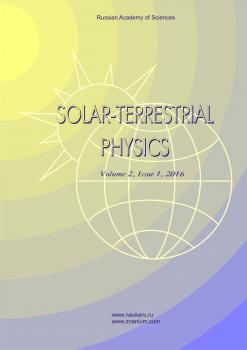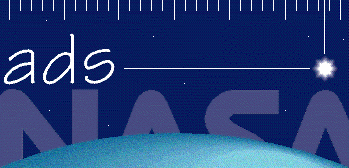Иркутск, Россия
Иркутск, Россия
Иркутск, Россия
Иркутск, Россия
Иркутск, Россия
Иркутск, Россия
Нагойя, Япония
Нагойя, Япония
УДК 55 Геология. Геологические и геофизические науки
The paper presents the results on first synchronous observations of variations in auroral luminosity and geomagnetic field, made with high temporal resolution at the ISTP SB RAS high-latitude station Istok (70° N, 88° E) in September–December 2018. Auroras were recorded with all-sky camera, pulsations in the auroras were recorded by a photometer in four spectral ranges with silicon photomultipliers. Continuous monitoring of geomagnetic pulsations was performed using a LEMI-30 three-component induction magnetometer. Both synchronous bursts of auroras and magnetic field pulsations, as well as disturbances of auroras, not accompanied by disturbances in the geomagnetic field, were observed. We note that the photometer clearly recorded short-period (~20 min) variations in in auroral luminosity. At the same time, some instability of the photometer signal level occurred at sufficiently long time intervals. In the photometer data, there are powerful signal bursts, probably of a hardware nature. Nevertheless, the temporary distribution analysis of the registration moments (registration frequency) of signal bursts indicates the possible dependence of the burst registration frequency on the geomagnetic activity level.
auroral atmosphere, magnetic pulsations, photometer, induction magnetometer
1. Arnoldy R.L., Lynch K.A., Austin J.B., Kintner P.M. Energy and pitch angle-dispersed auroral electrons suggesting a time-variable, inverted-V potential structure. J. Geophys. Res. 1999, vol. 104, pp. 22,613-22,622.
2. Beach R., Cresswell G.R., Davis T.N., Hallinan T.J., Sweet L.R. Flickering, a 10-cps fluctuation within bright auroras. Planet. Space Sci. 1968, vol. 16, pp. 1525-1526.
3. Beletsky A.B., Tashchilin M.A., Mikhalev A.V., Tatarnikov A.V. Shamrock SR-303i airglow spectral measurements. Sovremennye problemy distantsionnogo zondirovaniya Zemli iz kosmosa [Modern problems of remote sensing of the Earth from space]. 2016, vol. 13, no. 3, pp. 192-197. (In Russian).
4. Berkey F.T., Silevitch M.B., Parsons N.R. Time sequence analysis of flickering auroras: 1. Application of Fourier analysis. J. Geophys. Res. 1980, vol. 85, pp. 6827-6843.
5. Campbell W.H. Rapid Auroral Luminosity Fluctuations and Geomagnetic Field Pulsations. J. Geophys. Res.: Space Phys. 1970, vol. 75, no. 31, pp. 6182-6208.
6. Ermilov S.Yu., Mikhalev A.V., Ermilov S.Yu., Mikhalev A.V. Fast Variations In Mid-latitude Sky Optical Radiation. Issledovaniya po geomagnetizmu, aeronomii i fizike Solntsa [Research on geomagnetism, aeronomy, and solar physics]. Moscow, Nauka, 1989, vol. 84, pp. 119-125. (In Russian).
7. Fukuda Y., Kataoka R., Uchida H.A., Miyoshi Y., Hampton D., Shiokawa K., Ebihara Y., Whiter D., Iwagami N., Seki K. First evidence of patchy flickering aurora modulated by multi-ion electromagnetic ion cyclotron waves, Geophys. Res. Lett. 2017, vol. 44, iss. 9, pp. 3963-3970. DOI:https://doi.org/10.1002/2017gl072956.
8. Korobtsova L.P. Characteristics of Optical Bursts Observed in Yakutsk. Neodnorodnosti v ionosfere [Irregularities in the ionosphere]. Yakutsk. YF SO AN SSSR. 1981, pp. 96-102. (In Russian).
9. Kuzakova L.P. Short Bursts Of Integrated Radiation From Auroras. Geomagnetizm i aeronomiya [Geomagnetism and aeronomy]. 1972, vol. 12, no. 3, pp. 560-561. (In Russian).
10. McFadden J.P., Carlson C.W., Boehm M.H., Hallinan T.J. Field-aligned electron flux oscillations that produce flickering aurora. J. Geophys. Res. 1987, vol. 92, no. A10, pp. 11,133-11,148.
11. Nadubovich Yu.A. Outbreaks of 6300 and 5577 Å in auroras. Geomagnetizm i aeronomiya [Geomagnetism and aeronomy]. 1970, vol. 10, no. 5, pp. 926-929. (In Russian).
12. Paulson K.V., Shepherd G.G. Short-lived brightness oscillations in active auroras. Can. J. Phys. 1966, vol. 44, pp. 921-924.
13. Richardson G. Energetic Particles and Corotating Interaction Regions in the Solar Wind. Space Sci. Rev. 2004, vol. 111, iss. 3-4, pp. 267-376. DOI:https://doi.org/10.1023/B:SPAC.0000032689.52830.3e.
14. Roldugin V.K., Roldugin A.V. Change Periodicity in the Rigidity of the Invading Electrons During Auroral Pi3 Pulsations. Geomagnetizm i aeronomiya [Geomagnetism and aeronomy]. 2017, vol. 57, no. 3, pp. 298-306. (In Russian).
15. Shiokawa K., Katoh Y., Hamaguchi Y., Yamamoto Y., Adachi T., Ozaki M., Oyama S.-I., Nosé M., et al. Ground-based instruments of the PWING project to investigate dynamics of the inner magnetosphere at subauroral latitudes as a part of the ERG-ground coordinated observation network. Earth, Planets and Space. 2017, vol. 69, iss. 1, article id. 160, 21 p. DOI:https://doi.org/10.1186/s40623-017-0745-9.
16. Tung Y.-K., Delory G.T., Carlson C.W. Modulation of auroral field-aligned electron fluxes under two inverted-V structures at different altitudes. Geophys. Res. Lett. 2002, 29(10), 1428, DOI:https://doi.org/10.1029/2001GL013719.
17. URL: http://sdnet.thayer.dartmouth.edu/aacgm/aacgm_ calc.php#AACGM (accessed January 21, 2019).
18. URL: http://ckp-rf.ru/ckp/3056 (accessed January 21, 2019).



















